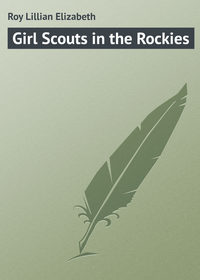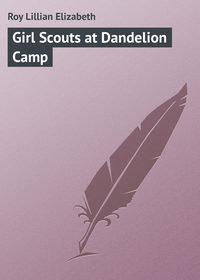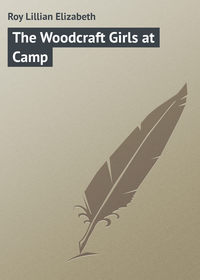 полная версия
полная версияGirl Scouts in the Adirondacks

Roy Lillian Elizabeth
Girl Scouts in the Adirondacks
CHAPTER ONE
THE FRIDAY JINX
"Are we ready to start, girls?" called Mrs. Vernon, the Captain of Dandelion Troop of Girl Scouts, as she glanced at her protegées seated in two large touring cars.
"Ready! Why, Verny, we've been waiting for you these ten minutes," retorted Juliet Lee, one of the original members of the troop.
"And we're just crazy to be off before that black cloud overhead adds to mother's fear lest I never come home again," added Ruth Bentley, another of the first four girl scouts of Elmertown.
"Well, then, it seems that all the baggage and outfit we need with us on the trip is safely stowed away, eh, Jim?" said Mrs. Vernon, looking at the driver of the other car.
"Everything that I found waiting to be packed when I drove up to the side door," replied the chauffeur.
"All right! Then we're off, folkses, but we'll send you word the moment we arrive at Old Forge in the Adirondacks," called Mrs. Vernon, to the crowd of relatives of the various girls, all gathered to watch the scouts drive away.
"Good-by! Good-by!" now shouted many girlish voices, and "Good-by! Good-by!" was shouted back as the two seven-passenger cars started on the long journey.
Mrs. Vernon led the way in her luxurious automobile, and as they turned the bend of the road, where the last of the group still watching on the Vernon lawn was lost to sight, she laughingly remarked:
"I never thought a crowd of girls could get ready for such a long outing in so short a time."
"It all depends on how badly the girls want to be ready, Captain," retorted Joan Allison, the fourth girl of the number who founded Dandelion Camp of Girl Scouts the summer before.
"Say, girls! I just felt a drop of rain from that inky cloud!" Betty Lee warned. She was Julie's sister, and they were two who had first suggested a scout organization.
Mrs. Vernon slowed down and turned to the scouts. "Shall we stop to put on the rain-curtains?"
"Mercy, no! It's only a sprinkle, and we're not sugar," exclaimed Joan, glancing at the sky.
The other girls followed her gaze, and Julie said: "See all the blue sky! Enough to make the proverbial 'night-cap'."
In case the reader has not yet met the four girls who had such a thrilling time while at camp the previous summer, it will be best to make their acquaintance now.
As stated before, Juliet and Elizabeth Lee were the two sisters who planned having a scout troop for girls in Elmertown. Joan Allison and Ruth Bentley, both schoolmates of the Lee girls, eagerly agreed to add their efforts to the others' and secure the interest of enough girls for them to be able to apply for a charter from the Girl Scout Headquarters in New York City.
Before they closed their camp on "Verny's Mountain" that summer, five other girls had been admitted to membership in the young Patrol, namely: Hester Wynant, fourteen; Anne Bailey, fourteen; Judith Blake, thirteen; her sister, Edith Blake, twelve; and Amy Ward, thirteen.
Then during the winter, other girls who had heard of the good times the scouts had had in camp that past summer became so insistent to mothers at home that permission to join the organization was granted them.
Having nine girls in their original Patrol, with Julie as Leader, and Joan for Corporal, the scouts now felt experienced enough to pass all the tests required to apply for a Troop Charter. The young scouts were an active group and when the Charter arrived from National Headquarters the same day the girls had planned to start for camp, there was great rejoicing.
True to his promise given the Girl Scouts the summer previous, Mr. Gilroy had sent word to Mrs. Vernon when the camp in the Adirondacks was ready for them. When the girls found that Mrs. Vernon planned to use her large touring car for half of the number in the Troop to go in, and Ruth Bentley's father had offered his car for the other half, thus saving them great expense for railroad tickets, and giving them the pleasure of autoing the whole long distance, the excitement rose and would not be calmed down again.
So it was not only a happy Troop that shouted good-by to relatives, but also a flushed, merry group of nine girls who could not keep silent for long.
Ruth was in the rear seat of her father's car, which Jim was driving, when she suddenly sat up and called out to the chauffeur:
"I'm sure one of our suitcases on the trunk-rack at the back must be loose, Jim. I hear it bump about every time you go over a rough place in the road."
"It can't be, Miss Ruth," returned Jim, trying to peer out and see the baggage; "I strapped 'em on good and tight before we left."
"Well, it happens to be my suitcase that's on top, and I'm sure I don't want to lose it," declared Ruth.
"Maybe we'd better stop and make sure about it; we can soon catch up with Verny again," suggested Judith.
So Jim sprang out to investigate. "The suitcases are all right, Miss Ruth, but somethin's wrong in the back all right."
At that Ruth jumped out and joined the man. "What is it?" asked she, anxiously.
"The sag in that spring 'pears to me to say it is about done for. We'll have to travel slow till we find a garage."
"For mercy's sake! Didn't you and Pa's chauffeur overhaul both the cars thoroughly when you knew we were going on this trip?"
"Your father sent this machine to the garage in Elmertown, 'cause he said they'd know how to do the job up better'n us," explained Jim.
"Then it serves Dad right if he has to pay for a new spring! The idea of trusting strangers with his car at this important time! But here we are with a wornout old spring on our hands!" cried Ruth, stamping her foot impatiently.
"Oh no, Ruth, not on our hands – but what is ten times worse – on the rear end of the car," laughed Hester.
"Well, we've got to go slow, I suppose, and stop somewhere to replace the old thing," grumbled Ruth, climbing back in the car.
"If 'Liza knew of this mischance, wouldn't she gloat over her 'Friday Bad Luck' prophecy?" laughed Ann.
Jim started again, but carefully avoided the ruts and bumps in the road until he came to a large garage. Fortunately for all, they found a new spring in stock and the men were soon at work replacing the bad one.
"Hurrah for us Jinx-breakers! This bit of luck in finding a new spring on hand more than offsets a Friday curse," gleefully cried Ruth.
"You young ladies sure are lucky, but it will take some time to do the work, an' you may as well take a walk and see our nice Jersey town," suggested the proprietor of the garage.
The scouts followed this sensible advice and stopped at a shop where they treated each other to soda, candy, and peanuts. There being nothing more thrilling to do, they sat down in the Park and ate the plebeian delicacy and talked.
"I love peanuts, don't you?" Anne asked of the girls.
"Yes, but they have to be enjoyed away from home, or folks will make fun of you," added Ruth.
"Not any more, Ruth. When a five-cent bag of peanuts, these days, only contains ten nuts that lifts them out of the cheap class," laughed Hester.
"And makes them a luxury, eh?" added Judith.
By the time the peanuts were gone, Jim signaled the girls and they hurried back to the garage. It took but a moment for them to jump in and urge Jim to hurry after Verny's car, somewhere in the lead.
Mile after mile of beautiful woodland, with now and then a small town, but with many flourishing farms along the way, were reeled off rapidly as the machine sped along as if on wings. Finally they reached a crossroad where the signboard warned them: "All travel limited to eight miles per hour."
"Slow down, Jim, or you'll land us in a county jail," called Ruth.
"Then Mrs. Vernon must be in jail – 'cause she ain't in sight along the road, and to get as far as this she had to speed," declared Jim.
"It's funny she wouldn't stop to find out what became of us, when we dropped so far behind," ventured Hester.
"They'll look us up at mealtime, never fear," laughed Anne. "We've got the hamper with us, you know."
The others laughed at this remark, but they had not gone much farther along the road before they spied the Vernon automobile waiting under a great oak tree. When the tardy car came up, both parties began to shout, some asking where the delinquents had been, and the unfortunates to demand why folks wouldn't look behind once in a while!
Finally Jim could make himself heard, and he explained about the spring and where they had to stop to replace the old one.
"Well, we stopped to discuss ways. We ought to decide the route we want to take before we reach Jersey City," said Mrs. Vernon.
"Which is the route you'd chose, Verny?" added Ruth.
"Well, we can save a lot of time by going along to Edgewater and cross on the Fort Lee boat. That takes us right to 130th Street and Broadway, New York. We avoid all crowds and city streets, but you will not see anything of the life and bustle of New York City."
"How much time will we save?" asked Julie.
"Because we've lost so much over that old spring," added Ruth.
Mrs. Vernon smiled. "From upper New York we can drive right onto the State Road that runs direct to Albany. By selecting that way we will save a great deal of time, because traffic in the city is so congested that every driver has to travel slow and fall in line back of endless cars. At every corner when the signal holds up the entire line one has to stop to permit crosstown traffic a chance."
"Then for goodness' sake, let's go through the country on this side of the Hudson, and cross where you said – Fort Lee Ferry," declared Julie.
Every one agreeing to this decision, the plan was carried out as outlined by the Captain. Once on Broadway, where it passes Van Cortlandt Park, the girls called to Mrs. Vernon.
"How about lunch – we're famished?"
"Oh, don't let's stop here for lunch. Let's go on till we find a nicer spot in the country," returned Joan.
"Maybe there won't be any better place," demurred Judith.
"Oh, yes, there is. After we leave Yonkers we will find lots of spots, Verny says," called Julie, from the first car.
"We need a shady place where a spring will give us water," said Betty.
"A spring failing to bubble up at the proper place, we may have to be satisfied with a pump at some farmhouse," retorted her sister.
The two cars sped swiftly along Broadway, through Yonkers, Hastings-on-Hudson, and Dobb's Ferry. At this last place the Captain pointed out the famous old Headquarters used by General Washington at the close of the Revolution.
"Girls, there doesn't seem to be any picnic grounds for us along this State Road," remarked Mrs. Vernon. "Suppose we take a bite as we travel along, and cook a regular dinner when we are out in the country somewhere?"
"We're willing, in fact, I am more than willing to eat," called Anne, the scout with the healthy appetite.
So they drove on while refreshments were passed around, and every one admired the river scenes of the ever-changing panorama of the Hudson.
Just beyond Peekskill the road ran under a culvert and a sharp turn on the other side made it impossible to see what was on the road ahead. The Captain made the turn very neatly and Jim was about to follow the leading car, when several shrill cries from the girls ahead caused him to put on the emergency brakes.
The passengers in the second car could just see what had caused the frightened shouts from their friends in the first car. A gaunt farm horse was standing on his hind legs pawing the air madly, while a rickety old spring wagon seesawed uncertainly on the edge of a deep ditch beside the road. But the driver of the horse was on the road, hanging on to the bridle while plying a stout hickory stick freely over the animal's back.
"Git down! Will yuh come to arth, yuh rascal?" shouted the irate woman who was garbed in a man's farm hat and a long duster.
"Do you need any assistance?" called Mrs. Vernon, anxiously.
"Not ef I kin git him to plant his feet on arth agin. He ain't got no spunk left to run away, 'cause he's ben out plowing all day, and it w'ar a shame to drive him to the store. But it hed to be, 'cuz the ole man tuk t'other hoss to go to a meetin'."
As the unusual character talked, she tugged at the bridle until she finally had the horse quieted down again. Then he allowed his long ears to droop lazily, his spine to sag in the middle, and his erstwhile springy legs to bend as if he felt too weary to stand up.
The woman with the weather-beaten face and toughened hands was a fluent speaker, even though she paid little attention to the latest style in dress for women. She leaned against the shaft of the wagon and plied her questions to the tourists as freely as she had plied the hickory stick to the horse.
"Be you-all out fer a lark?" asked she, eyeing the number of girls in both cars.
Jim thought to move his car gradually along the road so the scouts in his charge could join in the conversation with the woman. But the moment the horse saw the automobile crawling towards him, he jumped aside. The wagon-wheel turned suddenly and the unexpected happened; the woman who had been leaning heavily on the wheel was unceremoniously dropped to a sitting posture in the dusty road.
Several of the scouts had to smother with handkerchiefs, a keen desire to laugh, but the owner of the horse seemed to take the situation good-naturedly.
"Wal, ef that ain't jus' like Samson! He does the mos' onexpected tricks, so's that he keeps us guessin' what next."
Jim sprang out of the car when he saw the result of his innocent action with the engine, but the agile woman was up before he could reach her side. She brushed the dust from her long coat and chuckled aloud: "I allus said that animal oughter be called Delilah 'cuz she was so sly, but my ole man says 'Samson' was close enough to that critter, and this animal hez such long hair that it suits with the name."
"You've just had him clipped, I see," ventured Mrs. Vernon.
"Not clipped, Captain – but shorn of his locks like Samson," laughed Julie.
"Maybe that's why he feels so tired," added Joan, quickly.
Every one but the farmer's wife laughed. She seemed very serious over the conversation, and nodded her head affirmatively.
"Well, we have to drive on, madam, but we're sorry to have frightened Samson," said Mrs. Vernon, in order to make an end to the scene.
"Say, couldn't you tell us where there is a nice picnic place near here?" called Jim, as the first car started.
"Yeh – a few miles furder on. You'll find a nice little brook in a grove of sugar-maples, with green grass on all sides."
Jim thanked the woman, and started his car. Mrs. Vernon was informed of the grove which was to be a stopping place for dinner, and all were eagerly on the lookout for the spot that would offer such an ideal resting place.
But it was the longest "few miles" any of the scouts had traveled, for the meter showed many, many miles before any grove was seen. There was no brook in it, but the grass was very green, and the maple grove, which crowded a knoll a short distance from the road, looked cool and inviting.
As usual, Julie was the first one out of the cars and over the fence. She started to cross the very green grass, but instantly sank into the water that was hidden under the green blades.
"Help! Oh, I'm drowning!" shouted she, struggling to pull her feet clear of the bog. But she would free one foot, and instantly the other would sink. Then she tried to drag that one out, but the first one would go down again. Both together she could not get out.
"Oh, oh! See the mess poor Julie's in!" called one of the girls.
Mrs. Vernon was gazing quickly around for some sort of help to get the scout out, but the girls stood about the place sympathizing with the furious scout.
"Is it like that all over there, Julie?" called Betty, anxiously.
"How do I know? Come over and find out for yourself!" snapped her sister.
The girls laughed at the retort, but Betty added: "I only wanted to know if it was safe for me to come over and help you out."
Julie straightened up and glared at her soft-hearted sister. "You sound just like our Sunday school teacher when she reads: 'Come over into Macedonia and help.'"
Again the audience of girls laughed appreciatively, but Julie was too busy keeping her feet "treading water" to pay any attention to their enjoyment. Meantime, Jim had removed some rails from the fence and was bringing them to the scout's aid.
"Now, Miss Julie, when I shove these over, you manage to work an arm over each one, and sort of lift yourself out that way. I'll shove others over for you to step on next, and in that way you can get out and across to us," advised Jim, working as he spoke.
Finally Julie was rescued from the mire, and then the Captain said: "Every one walk along that elevated bank, over there, to reach the grove, as this entire area may be a boggy spring."
But the grass under the trees in the grove was found to be hard and dry, and they soon began to prepare luncheon. While Mrs. Vernon unpacked the hamper, the scouts were detailed on various duties: some to build a fire, some to hunt spring water, some to set table on the grass. But Julie was excused from all these tasks, as she had more than enough work to do in cleaning the mud from her boots and stockings.
When luncheon was almost ready, Judith and Amy, who had been sent to find the spring and bring back drinking water, reported: "We couldn't find any spring."
Julie looked up and jeered: "You are fine scouts! Couldn't find a spring when all you have to do is to find the source of all that water where I went down!"
"Water! That looked like mud," retorted Judith.
"We'll go for the water," volunteered Joan, catching hold of Betty's sleeve to take her along.
So they started, and as Julie had said, the spring that fed the boggy spot was not far back in the grove. The water gurgled down from a cleft in a huge rock, and on either side of the small pool wood violets dipped their fragrant petals into the sparkling mirror.
Betty sat down upon a flat rock beside the pool to enjoy the scene. But practical Joan filled the pail with cold water and then laughed at poetical Betty.
"Would you prefer to sit here and dream, Betty – or go back with me and eat ham sandwiches?"
"Oh, I forgot where I was," laughed Betty, rising reluctantly to help carry the pail of water.
"That's what I thought," tittered Joan, "but the rest of the girls prefer something more solid than dreams."
During the luncheon the Captain said: "Wouldn't it be splendid if each one of us kept a diary of what happens during this summer's camp? Then we can rewrite the facts when we go home and make a good story of it. Perhaps a real publisher will buy it from us and thus give us a fund for next year's outing – if we have one."
"Oh, that is great!" exclaimed several voices with girlish enthusiasm.
"Well then, when we camp to-night, we'll jot down the episodes of the day's trip – not forgetting to dwell at length on 'Samson,' and Julie's side-plays," remarked the Captain, smilingly.
"Has any one thought of a stopping place for the night?" asked Jim.
"Not definitely, Jim; but I hope to cross the river at Poughkeepsie and drive along the west shore as far as possible. Then we can pitch camp at any good place we find," replied the Captain.
They had not gone much farther before Ruth called: "It looks as if the rear tire on Verny's car was flat!"
The Captain slowed up, and every one tried to see the tire. "That's what it is, all right, Captain!" ejaculated Jim, impatiently.
"Dear me! That means another delay!" sighed several girls.
The car had to be jacked up and Jim went to work to mend the puncture in the tube, then pumped and pumped until the tire was properly inflated once more.
As the tourists climbed into their respective seats in the automobiles, Joan said: "Well, Captain, this wasn't such a bad day after all – in spite of being a Friday."
"I'm thankful for it, too," sighed Betty, fervently.
The cars made good time after that and passed over the ferry at Poughkeepsie, to travel northward on the road that ran along the west shore. They pitched camp in some woods and soon had a fire started to heat the canned soup they had brought. When all else was ready, the Captain banged upon a tin pan to call the scouts to dine.
"Um! That tomato soup smells good!" exclaimed Joan, sniffing audibly, as she saw the contents of the pan that stood over the fire.
"Will you serve it, Jo – you are nearest the pan?" said Mrs. Vernon, passing the basket that held the tin cups.
"Here! Everybody hold up a mug to fill, while I come around with the pan!" ordered Joan, taking hold of the pan-handle that had been over the fire a long time.
"Oo-oouch!" cried the girl, whipping her hand up and down as she danced wildly about.
"You didn't spill the soup, I hope!" exclaimed Anne, with deep concern.
"What difference would that make – a little cheap soup? But my hand – oh, it's got a trail blazed clean across the palm!" wailed Joan, showing her red-skinned hand to sympathizing friends.
"Poor old scout! We have to learn all kinds of blazing, I suppose," murmured Julie.
"And the soup is all safe – Jo never dropped the pan!" declared Anne, with gratification in her tones.
"Here, Miss Jo," said Jim, who had gone for a bottle kept in the kit. "Pour this olive oil all over the hand and the smart will soon stop."
He hurried to give the bottle to Joan but his toe caught in a bramble and tripped him. The bottle flew from his hand and struck the root where Joan sat. The glass shattered and the oil ran out the grass at the scout's feet.
"Well, well! it must be the Friday Jinx that still pursues us," remarked Jim, gazing regretfully at the glistening oil that formed beads on the blades of grass.
The girls laughed merrily, but Mrs. Vernon seemed serious. She was about to speak, when Amy asked Joan to pass the crackers. She picked up the box that was nearest her, and turned to hand them to her next neighbor, when her foot slipped on the oily grass and she sat down suddenly upon the stump. The box fell in Hester's lap, but Joan clapped a hand over her mouth and smothered a howl.
"Goodness me! What's the matter now, Jo!" cried Ruth, seeing the girl's convulsed face.
Joan shook her head helplessly, but her eyes were filled with tears. Every one wondered what could have happened, and when the scout could speak she said thickly: "Oh, that oil! I slipped and bit the end of my tongue clear off – I'm sure of it!"
"Stick it out and let's see," demanded Ruth.
"That's what comes of having too much of a good thing!" declared Julie, teasingly.
Every one but the Captain laughed, and she said seriously: "Do you know, girls, that I've had an idea about all this talk over Friday being a 'bad luck' day. Of course it is perfectly absurd to intelligent people, but there are enough superstitious folk left in the world who actually think Friday has some power to bring ill luck with it.
"Now I believe that it is the fear and general belief in the superstition that carries any weight with it. If we, as good intelligent scouts, will try to break this silly fear for others, we shall have to begin with ourselves, by not referring to the superstition with the sense of its having any power to act."
The girls listened seriously, as they always did when their Captain started one of her "sermonettes" as Julie called them; and when she had concluded, Joan said: "In other words, you want us to starve the poor wraith still more by withdrawing any thoughts from the matter whatever?"
"Exactly! You've worded it better than I could have done myself," responded the Captain, emphatically.
When supper was over and everything about camp had been prepared for the night, Joan suggested taking a stroll down the picturesque country road.
The gloaming was so inviting that the scouts decided to saunter down the woodsy road. They continued along the inviting footpath for more than a mile before they noticed a heavy fog settling upon everything.









